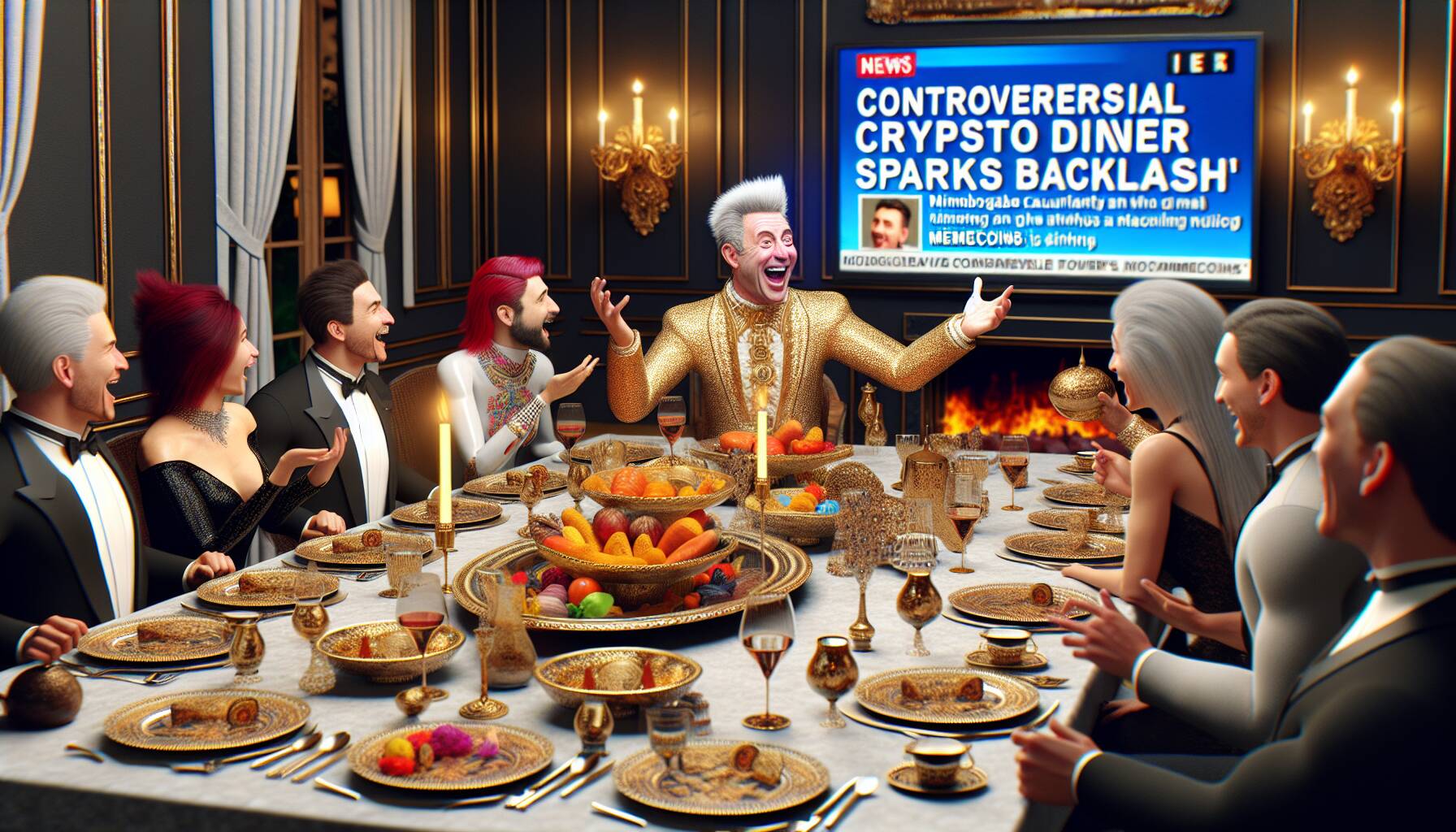The cryptocurrency world is buzzing this week, particularly with the intersection of politics and memecoins as former President Donald Trump gears up to host a lavish dinner for over 200 prominent memecoin investors at his Trump National Golf Club in Washington, D.C. Notably, among the guests will be significant figures, such as Tron founder Justin Sun, attracting considerable attention and generating much debate in the political arena.
However, not everyone is enthusiastic about this gathering. Democratic lawmakers and advocacy groups are preparing to protest Trump’s event, accusing him of exploiting his position for personal gain through his involvement in cryptocurrency ventures. Representative Maxine Waters, a leading figure among dissenting lawmakers, plans to rally her colleagues at the Capitol, denouncing the event as an instance of abuse of power. Waters intends to introduce new legislation aimed at prohibiting former and current officials from engaging in similar activities tied to digital currency, emphasizing the concerns over transparency and ethical governance.
“This dinner represents a blatant example of political access being sold to the highest bidder,” stated an organizing group ahead of the protest. “American democracy should not be for sale.”
Further reinforcing this sentiment, Senators Chris Murphy and Elizabeth Warren are also set to hold a press conference to discuss similar accusations against Trump’s crypto dealings. They aim to highlight the perceived risks associated with officials profiting from their political positions. While the guest list for the dinner remains closely guarded, speculation suggests that the financial contributions required to attend this exclusive event could run into the millions.
The controversy around Trump’s crypto engagement has prompted complications for legislation aimed at stabilizing the U.S. stablecoin market. Progress on these important regulatory measures had previously stalled due to the heated discussions surrounding the former president’s actions. As the political drama unfolds, critics continue to raise concerns about the opacity in the world of cryptocurrency and the potential implications for democratic integrity.
As events develop, the clash between the cryptocurrency community, Trump’s dinner guests, and the protesting lawmakers presents a captivating chapter in the ongoing narrative of cryptocurrency’s role in politics and governance.

Trump’s Memecoin Dinner: Controversy and Political Response
The recent dinner hosted by President Donald Trump for memecoin investors has sparked significant controversy echoed through protests and political measures aimed at curbing perceived corruption. Here’s an outline of the key points:
- Trump’s Dinner Event:
- Hosted over 200 leading memecoin investors at the Trump National Golf Club Washington, D.C.
- Attendees are major financial backers of Trump’s business entities.
- Protests and Legislative Actions:
- Democratic lawmakers and advocacy groups will hold protests in response to the dinner.
- Representative Maxine Waters is set to introduce a bill aimed at curbing crypto-related profits for U.S. officials.
- Senators Chris Murphy and Elizabeth Warren plan to hold a press conference to address Trump’s actions and similar legislative proposals.
- Accusations of Corruption:
- Critics accuse Trump of using presidential power to benefit personally from crypto ventures.
- Concerns about foreign buyers gaining access to the president without public knowledge have been raised.
- Impact on Legislation:
- The controversy has temporarily delayed progress on U.S. stablecoin legislation aimed at regulating digital asset issuers.
- Despite the tensions, legislative efforts are resurging with the bill clearing an important procedural hurdle.
“America Is Not For Sale” rally aims to challenge the political access being sold to the highest bidder.
This unfolding situation may significantly impact readers’ lives by highlighting the intersection of politics and finance, particularly in the evolving landscape of cryptocurrency regulation. Understanding these dynamics can inform citizens about the transparency and accountability of public officials, shaping their views on governance and economic fairness.
Trump’s Memecoin Dinner: A Divisive Focal Point for Political Tensions
The spotlight on President Trump’s dinner for memecoin investors, featuring prominent figures like Justin Sun, underscores significant cultural rifts within the cryptocurrency sphere and its intersection with politics. While this event might seem like harmless networking to some, critics argue it reflects a troubling trend of political influence being bought and sold, bringing considerable competitive advantages and disadvantages to both parties involved.
For the Memecoin Supporters: The ability to network directly with a former president provides an unmatched opportunity for these investors to gain political leverage and insights into the direction of cryptocurrency legislation. For individuals like Justin Sun, this attention could mean elevated status in the crypto community and a potential increase in the value of their holdings. The intimate setting allows them to forge relationships that may yield beneficial lobbying efforts concerning future regulations.
On the Other Side of the Coin: However, this event has sparked outrage among Democrats and various advocacy groups who decry its implications. The criticisms hinge on the ethics of inviting wealthy investors to a private dinner with the president, raising questions about corruption and transparency, especially with foreign entities possibly involved. Such allegations present significant political vulnerabilities for Trump as Democratic lawmakers rally public sentiment against perceived impropriety.
Potential Beneficiaries: This atmosphere of conflict could benefit Trump’s opponents. The organized protests led by figures like Representative Maxine Waters and Senators Chris Murphy and Elizabeth Warren aim to amplify concerns regarding corruption in political financing, potentially rallying voters who disapprove of such blatant political ‘pay-to-play’ scenarios. Grassroots movements, such as those spearheaded by Our Revolution, could gain momentum and visibility, engaging citizens who feel disenfranchised by the system.
Challenges Ahead: For cryptocurrency enthusiasts, this event might be a double-edged sword. While the visibility could drive interest and investment in unregulated digital assets, ongoing scrutiny and calls for legislation aimed at curbing presidential conflicts of interest may lead to more restrictive measures on crypto transactions. Should the opposition successfully mobilize support for reforms, it could stifle the very innovation the memecoin community hopes to foster.
Engagement and Activism: The resulting discourse from this dinner highlights a critical point: the intersection of politics and cryptocurrency is unlikely to remain static. Activists and lawmakers are likely to leverage this moment to push for stricter regulations that may reshape the landscape, primarily benefiting those who advocate for transparency and accountability in political financing.

















